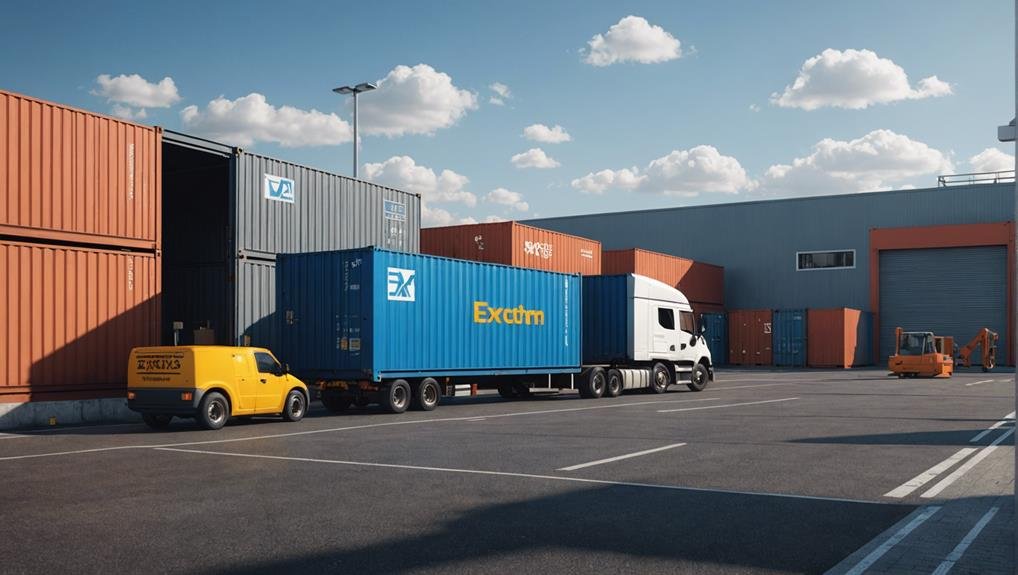Ex Works (EXW) Defined, Pros and Cons, Plus More Incoterms
Ex Works (EXW) in international trade means sellers have minimal duties compared to buyers, who handle loading, transport, customs, and costs. Benefits include cost efficiency and risk management for sellers, but buyers face post-delivery risks. Ensuring clear roles upfront is crucial for successful EXW agreements. Comparing EXW to FOB and FCA highlights variations in responsibilities and ownership transfer. Buyers take on more tasks under EXW, affecting costs. Understanding these nuances is key for smooth trade transactions. For further insights on EXW, including obligations and risks for both parties, explore the full details on this international trade agreement.
Key Takeaways
- EXW minimizes seller obligations, shifting responsibilities and costs to the buyer.
- Buyers handle loading, transport, customs, and insurance under EXW terms.
- Seller benefits include cost efficiency, risk management, and minimal responsibilities.
- Buyer faces risks post-goods availability, such as transportation and customs clearance.
- Understanding differences between EXW, FOB, and FCA helps choose the right Incoterm for specific needs.
Ex Works (EXW) Meaning and Purpose
In understanding the meaning and purpose of Ex Works (EXW), it is essential to grasp the fundamental concept of seller's obligations in international trade agreements. In an EXW agreement, the seller's responsibilities are minimal compared to the buyer's extensive obligations. The seller's primary duty is to make the goods available at a specified location for the buyer to collect.
On the other hand, the buyer is responsible for all aspects post-collection, including loading the goods, arranging transportation, handling customs formalities, and bearing any associated costs. This places a significant burden on the buyer regarding logistics and expenses, making it essential for parties to clarify and understand their roles and responsibilities before entering into an Ex Works arrangement.
Pros and Benefits of Ex Works
When evaluating the advantages of utilizing Ex Works (EXW) in international trade agreements, sellers benefit from minimizing their responsibilities and liabilities. This Incoterm offers cost efficiency for sellers as they are not burdened with loading, transport, and customs fees. Risk management is also a key advantage, as sellers are relieved from potential risks once the goods are made available at the agreed-upon location. On the other hand, buyers take on various responsibilities, including loading, transport, customs fees, and insurance costs. The following table highlights the key points regarding cost efficiency, risk management, buyer responsibilities, and seller advantages in Ex Works agreements:
| Aspect | Description |
|---|---|
| Cost Efficiency | Sellers save on shipping and liability costs. |
| Risk Management | Sellers shift risks to buyers post-product availability. |
| Buyer Responsibilities | Buyers handle loading, transport, customs fees, and insurance costs. |
| Seller Advantages | Sellers have minimal responsibilities and liabilities after goods are available. |
Cons and Limitations of Ex Works
Among the benefits of using Ex Works (EXW) in international trade, it is important to recognize the cons and limitations associated with this Incoterm.
- Risk allocation: The buyer bears all risks once the goods are made available, including transportation and customs clearance risks.
- Cost implications: Buyers are responsible for all costs post-shipment, such as transport, insurance, and customs fees.
- Limited seller responsibility: Sellers have minimal obligations under Ex Works, potentially leading to increased burden on the buyer.
- Challenges in certain regions: Strict customs regulations in some areas may make Ex Works less advantageous due to the increased complexities and costs for the buyer.
Comparison With Other Incoterms
When evaluating Ex Works (EXW) in comparison with other Incoterms, it is essential to meticulously scrutinize the distinct buyer and seller obligations delineated by each trade term. In comparing EXW vs. FOB, Ex Works places the responsibility of loading costs on the buyer, while FOB obligates the seller to load the goods.
Additionally, FOB transfers ownership when goods are loaded onto the buyer's transport, with seller responsibilities during transport varying based on contract terms. On the other hand, comparing EXW vs. FCA, Ex Works requires the buyer to handle loading, transport, customs fees, and insurance costs, while FCA places more responsibility on the seller regarding delivery to the carrier at a specified location.
The choice between these Incoterms depends on the specific needs and circumstances of the parties involved.
Additional Insights on Ex Works
In delving deeper into the intricacies of Ex Works (EXW), a critical aspect to ponder is the nuanced handling of loading, transport, and associated costs by both the seller and buyer in international trade transactions.
- Risk Allocation:
- Under Ex Works, the buyer assumes risks from the point of receiving the goods.
- Sellers are responsible for ensuring the goods are available at the specified location.
- Cost Implications:
- Buyers bear the costs associated with transport, customs, and insurance.
- Sellers may incur minimal expenses, primarily related to making the goods available.
These considerations underscore the importance of understanding the division of responsibilities and costs in Ex Works agreements to facilitate smooth and cost-effective international trade transactions.
Conclusion
To sum up, delving into the intricacies of Ex Works (EXW) and other Incoterms is essential for businesses engaged in international trade. Understanding the implications of EXW can lead to successful and mutually beneficial trade relationships.
By investigating the truth of these theories and gaining a thorough understanding of the responsibilities and obligations involved, businesses can navigate the complexities of international trade with confidence and efficiency.







